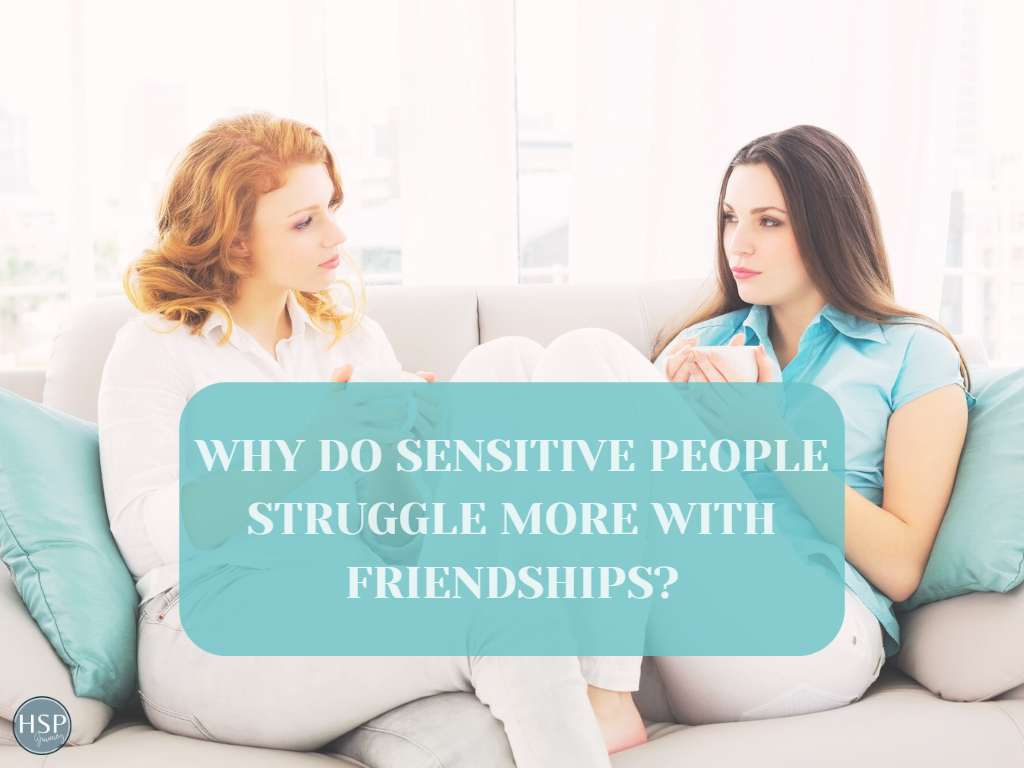For many highly sensitive people, navigating friendships can be tricky territory. Because we tend to feel things quite intensely, overthink what we say and do, and sometimes over-connect with people in our attempts to show our affection, sensitive people struggle more with friendships. Moreover, you likely find that deep, meaningful connections are a non-negotiable need, and anything less can be unsettling or dissatisfying.
Navigating social landscapes can seem overwhelming when you’re attuned to the subtlest nuances of communication and trust. For you, trust is integral to building and maintaining friendships. As someone who values trust, you might take longer to open up to new people, carefully assessing whether a potential friend can honor your sensitivity. Your empathetic nature allows you to be an excellent listener and a supportive companion, but it also means you might absorb the stresses and emotions of those around you, sometimes at the expense of your own well-being.
Finding friends who understand and respect your unique way of processing the world is essential for your relational happiness and peace of mind.

Table of Contents
Reasons Why It Can be Hard to Maintain Friendships in General
Building and maintaining friendships can be a challenging task. It isn’t just about finding people you enjoy spending time with; there are practical elements that can make it difficult to keep those connections strong.
Physical Distance
Physical distance plays a significant role in the difficulty of maintaining friendships. When you’re far apart, the opportunities to meet up and share experiences decline. Although technology can bridge the gap to an extent, there’s no true substitute for face-to-face interaction, which is vital for meaningful relationships.
Busy Lifestyles
Your life is likely filled with commitments—from work to personal responsibilities—which can make it feel like there’s not enough time in the day. A busy schedule means time alone or with friends becomes scarce, putting a strain on friendships. Social gatherings may often be sacrificed to meet other obligations, and over time, this can lead to weakened connections.
Changing Priorities
As you evolve, so do your priorities. What mattered to you years ago may not hold the same weight today. Friendships can be affected when there’s a misalignment in what you both consider important. For instance, a friend might prioritize career advancement while you might be more focused on personal development or family time.
Divergent Interests and Values
Shared interests and values are the backbone of most friendships. However, when those common interests shift, maintaining the friendship can be challenging. It’s not uncommon to grow in different directions, and when the attention each of you dedicates to the friendship no longer matches, it can lead to feelings of stress and disconnect.
Looking for HSP Tools to Thrive in a Chaotic World?
The modern world is often overwhelming and stressful for those of us with sensitive nervous systems. Many of us have suffered from the challenges of high stress, anxiety, sensory overload, and mental health and physical health issues. Fortunately, after years of working with and researching Highly Sensitive People (HSPs), Julie Bjelland has developed many tools that have not only helped her but thousands of HSPs all over the world move out of survival mode living and into thriving. In this free webinar, she’ll share the tools that HSPs have found the most life-changing. Her goal is to help you live to your fullest potential because the world needs you.
Join this free webinar and get tools to help you thrive as an HSP!
Challenges for Highly Sensitive People in Friendships
Highly sensitive people (HSPs) often face unique obstacles in forming and maintaining friendships. These challenges stem from their deep emotional responses, heightened empathy, and need for meaningful connections, which can be both a gift and a barrier to close relationships.
Emotional Intensity
Your capacity for deep feelings means that relationships carry a strong emotional charge for you. This can lead to intense experiences where your happiness and pain are felt more acutely, sometimes making friendships overwhelming. We sensitives sometimes over-communicate the joy and intensity we feel to our friends and this can come off as too much, or even weird to someone who isn’t sensitive and doesn’t understand you that well.
Personal Insecurities
As a sensitive person, you might struggle with self-doubt and deep-seated fear of rejection (probably from your childhood), which can prevent you from opening up to potential friends and lead you to misinterpret harmless comments as negative judgments. Plus our “pause and check” tendencies can come off as aloofness or coldness, which is quite the opposite of how an HSP typically feels inside. Building a new friendship is like a slow fire setting ablaze–it grows warmer and warmer as the flame increases. A good friendship takes time to build and often, our insecurities can hold us back from leaning into a new friendship fully.
Social Anxiety
Many HSPs struggle with a myriad of anxiety symptoms. Some require clinical help through medication, and other anxieties can be helped through therapy and good mental health tools. Sometimes, the fear of social situations might be more pronounced for you due to a natural tendency to become overstimulated in busy environments. This can limit your social interactions and hinder the development of new friendships. Overall, pinpointing what is causing you stress is vital to building a good self-care regime and handling social situations well. You can do it!
Introversion and Need for Alone Time
If you’re an introvert and an HSP (70% of HSPs are introverts), the need to recharge in solitude is essential. Friends might not always understand your desire for alone time, which can create friction in relationships. When I was in college, I would often spend the bulk of the weekend with my best friend, who I didn’t get to see during the week because we attended different schools. I loved spending so much time with her! But by 4:00 pm on Sunday, I was ready for some alone time. I often joke that it takes me double the amount of hours to recover from a social event. For instance, if I go to a party for two hours, I need four hours to recover. It’s not too far off from reality. Many friends who are extroverts don’t understand this at all. Also, each person has individual needs–some people need more alone time, some less.
Unresolved Past Issues
Past trauma or negative experiences can linger and impact your current friendships. Without self-acceptance or addressing these issues, they can make forming new bonds particularly challenging. Whether childhood issues, teen friendships gone awry, or romantic partnerships that left much to be desired–all bad experiences can stick with us if we don’t work to unpack them, review what went right, what went wrong, and work toward closure and healing.
Difficulty Setting Boundaries
You might find it hard to assert your needs or say no to others, fearing that setting boundaries will push people away. This can lead to burnout and resentment in friendships. HSPs are notorious for attracting “energy vampires,” who tend to pray on sensitive souls who love to pour into others and give as much as they can. As you evaluate current friends and welcome new friends, be careful to avoid those who display narcissistic tendencies, as they tend to pull more from a friendship without giving much in return.
Overthinking About Relationships
Your perceptive nature means you often reflect deeply on your interactions, which can spiral into overthinking and cause unnecessary stress about the state of your relationships. You might find yourself recalling a conversation as though you were watching a replay of an NFL game–reviewing what they said, how you laughed, if you showed enough empathy, or perhaps you notice that the conversation was all about them and very little about you.
I’m careful in one-to-one situations to make sure I ask enough questions about my friend. Often, the lunch comes to a close and I realize they didn’t ask me one thing about me! I’ve learned to temper my overzealousness to connect to leave space in the conversation for them to reciprocate, but this has taken lots of years of practice.
Inability to Handle Criticism
Given your sensitivity, even constructive criticism can feel deeply personal and hurtful, making it difficult to navigate conflicts within friendships without feeling wounded or misunderstood. I noticed that I don’t love overbearing, super-opinionated personalities. They typically unknowingly stomp all over my opinions, stick their foot in their mouth, and act brash and disrespectful–I avoid this type of person at all costs. Taking constructive criticism is something altogether different and can be managed incrementally with time, energy, and effort.
Empathy Overload
Your high levels of empathy allow you to compassionately connect with others, but they can also lead to empathy overload where you take on your friends’ emotions, leading to sensory and emotional overload.
In navigating these challenges, remember that your sensitivity is also what makes you a thoughtful and caring friend. Self-care practices and building emotional intelligence can help you create and sustain fulfilling friendships.

Building and Maintaining Quality Relationships
To foster meaningful relationships as a sensitive person, it’s essential to embrace your unique qualities and understand the importance of communication, emotional intelligence, and self-care. These elements not only enhance your connections with others but also strengthen your sense of self-worth and contentment.
Practicing Self-Acceptance and Self-Care
Understanding and accepting your need for alone time can be a powerful form of self-love. By acknowledging your traits—like depth and conscientiousness—you can turn them into strengths within your friendships. Remember, self-care isn’t selfish; it’s necessary. Regularly setting aside time for self-care allows you to recharge and can improve trust in all kinds of relationships by preventing burnout.
- Trust in yourself: Believe in your value in relationships.
- Self-care strategies: Allocate time for activities that revitalize you.
Improving Emotional Intelligence
Your capacity for deep connections and empathy is a gift. To use it effectively, work on recognizing and managing your emotions, which can foster a meaningful relationship. Heightened emotional intelligence leads to better listening skills, allowing for authentic exchanges that resonate with a sense of purpose and intimacy.
- Empathy: Enhance mutual understanding in friendships.
- Depth: Seek and nurture relationships with substance and profound engagement.
Effective Communication Skills
Open and honest communication is the bedrock of lasting friendships. Clearly express your thoughts and also be an attentive listener. Don’t shy away from discussing your preference for deep, meaningful conversations over small talk. Setting boundaries is a part of effective communication; it ensures mutual respect and understanding of each other’s needs.
- Conversations: Prioritize quality dialogue that reinforces the bond.
- Setting boundaries: Establish clear limits to maintain balance and respect.
By integrating these practices into your life, you can build and maintain relationships that honor your sensitive nature and enrich your and your friends’ lives.
Navigating Social Interactions and Spaces
As a sensitive person, you might find that navigating social spaces is as much about managing the energy around you as it is about the interactions themselves. Here’s how you can tackle common challenges and find spaces where you thrive.
Managing Sensory Overload
Sensitive individuals, like yourself, often have a heightened response to sensory stimuli. To manage sensory overload, it’s important to recognize the signs that you’re becoming overwhelmed. This could mean finding a quiet corner during a party to regain your composure or wearing headphones in busy areas to control the level of auditory input.
Remember, it is entirely okay to step away for some much-needed alone time to prevent or recover from anxiety peaks.
Seeking Out Comfortable Environments
Comfortable environments play a vital role in your social well-being. Look for places that are less likely to be overstimulating. It could be a cozy cafe rather than a noisy bar, or a peaceful park instead of a crowded festival. Trust your empathetic nature to guide you toward surroundings where your personality can shine without the risk of becoming isolated.
Finding Community and Support
Building quality friendships and finding a supportive community are essential for reducing feelings of isolation. Seek out groups where small talk isn’t the main currency, but rather meaningful conversation is valued. Align with others who understand the need for clear boundaries and respect your unique ways of overthinking and processing emotions. Whether it’s a book club or a hiking group, look for managers or leaders who are understanding and can create an inclusive environment that helps prevent feelings of being overwhelmed, addressing concerns before they lead to tears or discomfort.
Overcoming Personal Hurdles to Connect Deeply
Embarking on the journey to build deeper connections can be challenging, especially if you’re highly sensitive. This section will guide you through overcoming the personal hurdles you might face as a sensitive person striving for meaningful friendships.
Addressing Fear of Rejection and Insecurities
As an HSP, you may have a deep-seated fear of rejection that holds you back from reaching out and forming closer bonds. This often stems from a past of criticism or misunderstanding. To tackle this, start by acknowledging your fear and then actively challenging it with positive affirmations and small, controlled exposures to social situations. Remember, not all interactions will lead to rejection; more often, they pave the way to fulfilling relationships.
- Affirmations: “It’s okay to be me. I am worthy of meaningful friendships.”
- Controlled Exposure: Begin with low-risk social settings and gradually increase your comfort zone.

Looking for an HSP-Trained coach to help you align your life with your priorities?
Through my Highly Sensitive Person (HSP) certification with the Nickerson Institute, as well as being an HSP, I offer HSP coaching to develop specific goals around your HSP needs. We HSPs frequently deal with anxiety and overstimulated nervous systems that prevent us from achieving peace and attaining our life goals. HSP coaching with me includes a detailed review of your sensitivities and a mutually-desired plan for growth and management of this superpower to shift negativity and begin seeing yourself as the hero of your own story. (Affordable monthly coaching begins at $150/month.)
Cultivating Self-Compassion
A sensitive person tends to hold themselves to high standards of perfectionism, but this can lead to an unforgiving inner critic. Cultivate self-compassion by recognizing that everyone has moments of self-doubt. Encourage self-acceptance and understand that mistakes are to grow from, not dwell on.
- Self-Care Routine: Include activities that nurture your well-being, such as reading or a relaxing bath.
- Inner Lives Acknowledgment: Give credit to your rich inner world and how it can contribute to quality friendships.
The Role of Boundaries in Healthy Relationships
Understanding and setting boundaries is crucial to protect your energy and prevent feeling overstimulated. Clear boundaries keep toxic individuals, such as narcissists, at bay and ensure that small talk doesn’t drain you. Establish and communicate your needs to potential friends—it’s the bedrock of trust and long-lasting connections.
- Boundaries Checklist:
- Time for self-care
- Space for silence
- Permission to say no
Your boundaries will show others how you want to be treated, leading to friendships that respect and cherish your sensitivity.
Be sensitive, be free
*This post contains affiliate links and I will be compensated if you make a purchase after clicking on my links*





[…] can help Highly Sensitive People develop greater self-awareness, build resilience, and tap into their unique gifts and strengths. By […]